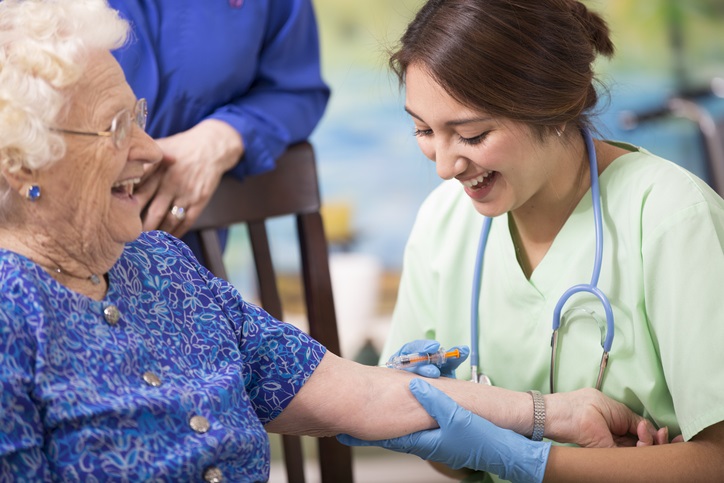
Most people understand the importance of getting their children vaccinated. A great deal of attention has been paid to protecting them from dangerous conditions that could affect their undeveloped immune systems. Although much attention has been paid to the youngest portion of our population, there is another at-risk group that needs to be aware of vaccines that can help keep them healthy – our senior citizens.
There are many vaccines recommended for older adults but unfortunately, many seniors do not receive them. Failure to do so can lead to serious consequences because as we age our immune systems weaken and the likelihood of developing serious complications increases greatly.
There are four suggested vaccines that all adults over the age of 65 should receive. They are:
- Influenza vaccine – It is estimated that approximately 30 percent of seniors do not receive their annual flu shot. This is alarming because according the Centers for Disease Control and Prevention (CDC), approximately 85 percent of all seasonal flu-related deaths are among people 65 and older. Getting a flu shot every year can drastically decrease the chances of getting the flu and the complications that accompany it.
- Pneumococcal vaccine – Older adults are much more likely to develop complications from the pneumococcal bacteria, such as blood infections, meningitis and pneumonia itself. Pneumococcal disease is responsible for the deaths of about 18,000 individuals over the age of65 each year. To protect against pneumonia it is recommended that all adults over 65 receive a series of two vaccines administered one year apart.
- Tdap booster – This vaccine provides protection against three conditions – tetanus, diphtheria and pertussis. This is especially important for older adults who spend time around infants, such as grandchildren since pertussis, also known as the whopping cough, is a highly contagious respiratory infection that can be life-threatening to babies. Even if you received this vaccine as a child it’s important to get the booster as its effectiveness wanes over time.
- Shingles vaccine – The infection herpes zoster develops when the chickenpox virus, which lies dormant in almost all adults who had chickenpox as a child, reactivates later in life. When it returns it can cause a blistering painful rash. It is recommended that all adults over the age of 50 receive the shingles vaccine, even if they already had shingles. The latest and most effective shingles vaccine is given in two doses, six months apart.
All older adults should adhere to these vaccinations to protect not only themselves but their loved ones as well. If you are over 65, speak to your doctor to find out if you are up to date with all your recommended vaccines. If you would like to make an appointment with a doctor at Flushing Hospital’s Ambulatory Care Center, please call 718-670-5486.
All content of this newsletter is intended for general information purposes only and is not intended or implied to be a substitute for professional medical advice, diagnosis or treatment. Please consult a medical professional before adopting any of the suggestions on this page. You must never disregard professional medical advice or delay seeking medical treatment based upon any content of this newsletter. PROMPTLY CONSULT YOUR PHYSICIAN OR CALL 911 IF YOU BELIEVE YOU HAVE A MEDICAL EMERGENCY.
